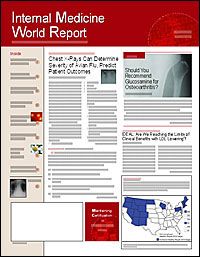Publication
Article
Internal Medicine World Report
Screening for Colorectal Cancer Inadequate in Colitis Patients
MADRID?Gastroenterologists need to do a better job of monitoring and screening their patients with ulcerative colitis for colorectal cancer, according to a pre?sentation at the 7th Symposium on Infla?mmatory Bowel Diseases and Salicylates.
"Studies in the United States and New Zealand have shown that only about 20% of gastroenterologists are able to correctly identify dysplasia," said Antoni Obrador, MD, director, Gastro?enter?ol?ogy Division, Son Dureta Hospital, Palma de Mallorca, Spain. "In addition, a Dutch study found that only about one fourth of gastroenterologists fol?lowed established guidelines for colorectal cancer screening in ulcerative colitis patie?nts."
According to guidelines issued together by the American Gastroenterology Assoc?ia?tion and the American Cancer Society, routine screening should begin 8 to 10 years after the onset of pancolitis and 15 to 20 years after the onset of left-sided disease. Patients with ulcerative colitis have a 2% probability of developing colorectal cancer after 10 years of disease, and the risk increases to 8% and 18% after 20 and 30 years, respectively.
Sexually Transmitted Infections on the Rise in UK
LONDON?The UK government is reporting a dramatic increase in syphilis rates, according to data from the Health Protection Agency, which show that the rate has grown >550% since the year 2000. Overall, 2254 cases of syphilis were diagnosed in the United Kingdom in genitourinary clinics in 2004, which represents an annual 37% increase over the past 4 years.
The agency also noted a 9% increase in chlamydia, with 105,155 new cases in 2004. Chlamydia screening has re?veal?ed that roughly 12% of 16- to 25-year-old persons are infected with this sexually transmitted disease.
In addition, during 2004, a total of 7275 new diagnoses of HIV infection were re?ported in the United Kingdom, a slight increase from the 7217 new cases that were diagnosed in 2003. Most of the new cases were diagnosed in heterosexual men and women, and 73% were likely to have been acquired while staying in Africa, the report states. The only sexually transmitted diseases to have shown declining rates in the United Kingdom in 2004 were gonorrhea and genital herpes.
Can Hospital Deaths Be Avoided?
LONDON?Nearly 5000 deaths could be prevented each year if the United Kingdom's "worst managed" hospitals performed better, according to research conducted by an independent health information provider known as Dr Foster.
The organization has documented that hospital death rates vary widely across the UK National Health Service. Overall, 17 patients die in hospitals ?considered "poor performers" for every 10 who die in hospitals considered the "best performers."
The report points out that death rates have improved by 2% to 3% in recent years. However, if all hospitals with above-average mortality rates improved their perfor?mance to reach the average, 5000 lives would be saved each year.
The research also showed that few hospitals are equipped to treat infections such as the methicillin-resistant Staph?ylococcus aureus (MRSA) superbug. One third of hospitals do not screen patients for MRSA, and only 3% of hospitals have isolation wards.
Drugs to Treat Alcohol Abuse Underused in Australia
SYDNEY?The Royal Australian College of Physicians maintains that primary care physicians underprescribe medications that are targeted to treat alcoholism.
Antialcoholism agents are only being prescribed in about 10% of eligible patients, Robert Ali, MD, head of the college's Division of Addiction Medicine, said.
Dr Ali suggested that the low prescribing rate of pharmacotherapy for al?co?hol addiction may reflect the fact that primary care physicians harbor a "fatalistic" view of alcoholism treatments in general. "They tend to think that nothing works," he said.
He noted that in Australia, primary care physicians have the right to prescribe drugs such as acamprosate (Campral), naltrexone (ReVia), and supervised disulfiram (Anta?buse), which have proven effective treatments for alcohol dependence, but many physicians neglect to prescribe them.
Healthy French Lifestyle a Myth
PARIS?Research by 2 government agencies puts to rest the popular misconception that the French maintain a healthy lifestyle.
A report by the French National Sta?tis?tical Institute found that >50% of French people are overweight, alcoholics, or smokers?3 major risk factors for chronic diseases and increased mortality. And a study by the French Health Ministry has concluded that 23,000 deaths each year are related to alcohol use.
The ministry also found that French men have an unhealthier lifestyle than French women. Approximately one third of men smoked, 50% were overweight, and at least 10% drank excessively.
Compiled by our Paris-based correspondent Jill Stein.






